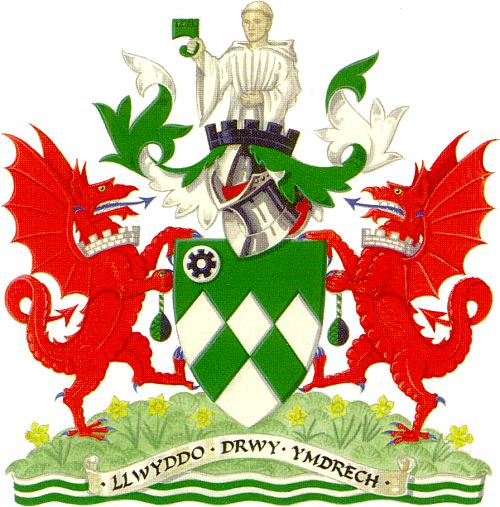Neath and Port Talbot: Difference between revisions
Knorrepoes (talk | contribs) m (Text replacement - "Literature : " to "'''Literature''': ") |
Knorrepoes (talk | contribs) m (Text replacement - "Additions :" to "Additions:") Tags: Mobile edit Mobile web edit |
||
| Line 3: | Line 3: | ||
'''NEATH PORT TALBOT''' | '''NEATH PORT TALBOT''' | ||
Additions : 1996 [[Neath Borough]] (1974 [[Neath RDC]] (partly)), [[Port Talbot]] (1974 Glyncorrwg UDC, [[Port Talbot Borough]]), [[Lliw Valley]] (partly, 1974 Llwchwr UDC, Pontardawe RDC) | Additions: 1996 [[Neath Borough]] (1974 [[Neath RDC]] (partly)), [[Port Talbot]] (1974 Glyncorrwg UDC, [[Port Talbot Borough]]), [[Lliw Valley]] (partly, 1974 Llwchwr UDC, Pontardawe RDC) | ||
[[File:neathpt.jpg|center|Arms (crest) of {{PAGENAME}}]] | [[File:neathpt.jpg|center|Arms (crest) of {{PAGENAME}}]] | ||
Revision as of 10:45, 28 January 2024
| Heraldry of the World |
| British heraldry portal Civic heraldry of the United Kingdom |
|
NEATH PORT TALBOT
Additions: 1996 Neath Borough (1974 Neath RDC (partly)), Port Talbot (1974 Glyncorrwg UDC, Port Talbot Borough), Lliw Valley (partly, 1974 Llwchwr UDC, Pontardawe RDC)
Official blazon
Origin/meaning
The arms were granted in 1996.
The shield is divided per chevron three times as a reference to the three chevronels of the Clare family, Earls of Gloucester descended from Robert Earl of Gloucester (illegitimate son of Henry 1) who founded Neath and Margam Abbeys and whose family became Lords of the Manor of Glamorgan. Three chevronels are said to be the arms of Iestyn ap Gwrgan (living 1083-93) ruler of Glamorgan. The three chevronels occurred in the shield and badge of the former West Glamorgan, and the shield of the former Port Talbot, an the arms of the former Neath contain a hint of them in the division of the shield as per chevron. The colours green and white were the Tudor livery colours and have become the Welsh national colours. They occurred in the arms of the former West Glamorgan and in those of the former Lliw Valley, where they represented hills and valleys.
The silver roundel charged with a black cogwheel uses the colours of the arms of the former Neath. The black relates to the coal, oil and manufacturing industries and the silver to metal industries.
Cogwheels featured in the crests of the former West Glamorgan and in the former Lliw Valley.
The demi Cistercian monk in the crest refers to the Cistercian Abbeys of Neath and Margam and it formed part of the crest of Neath. The monk emerges from a black mural crown as in the crest of the former Lliw Valley. The crown is also a reference to the black and white towers in the arms of the former Neath. The monk holds a clarion, an emblem said to have been used as a punning Badge by the Clare family. Three clarions were used on early seals by the Abbeys of Margam and Neath. The origins of this heraldic emblem are obscure but it may possibly represent a portable organ and in modern times it has certainly been used as a symbol of music.
It represents not only the Clare family but the importance of music locally and throughout Wales. It appears prominently in the Arms and Crest of the former Port Talbot, but the musical allusion is made in the Neath Arms by a harp.
Two Welsh dragons serve appropriately as supporters. The dragon occurred in the former West Glamorgan Crest and in the supporters of the former Neath and former Lliw Valley Crests. They hold cords of the livery colours from which are suspended the two hybrid emblems from the arms of the former West Glamorgan namely a green pine cone (for forestry and the countryside) dimidiating a Goutte Sable, or black droplet (for oil refining and connected industries). The dragons wear mural crowns round their necks as a reference to their civic nature. They stand on a grassy compartment set with Welsh daffodils and stylised waves of white and green as in the arms and badge of the former Lliw Valley and part of the former West Glamorgan compartment (where they are white and blue).
The motto at the base of the Arms is in the Welsh language, and reads LLWYDDO DRWY YMDRECH. This, translated into English is SUCCEEDING THROUGH ENDEAVOUR.
Contact and Support
Partners:
Your logo here ?
Contact us
© since 1995, Heraldry of the World, Ralf Hartemink 
Index of the site
Literature: Image and information provided by Laurence Jones (laurencejones@eircom.net)












